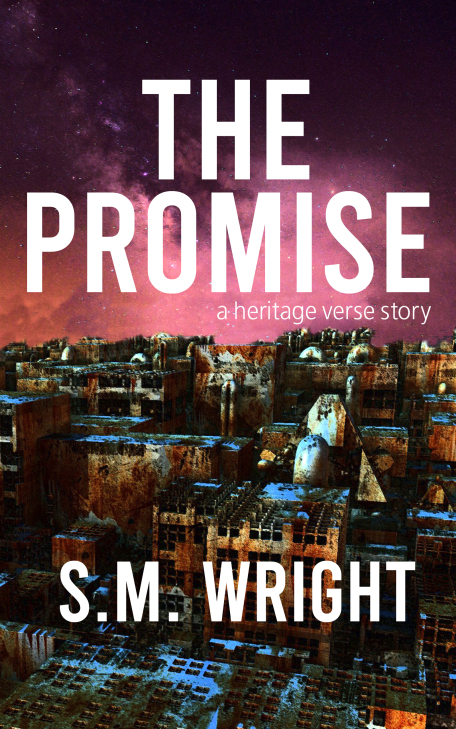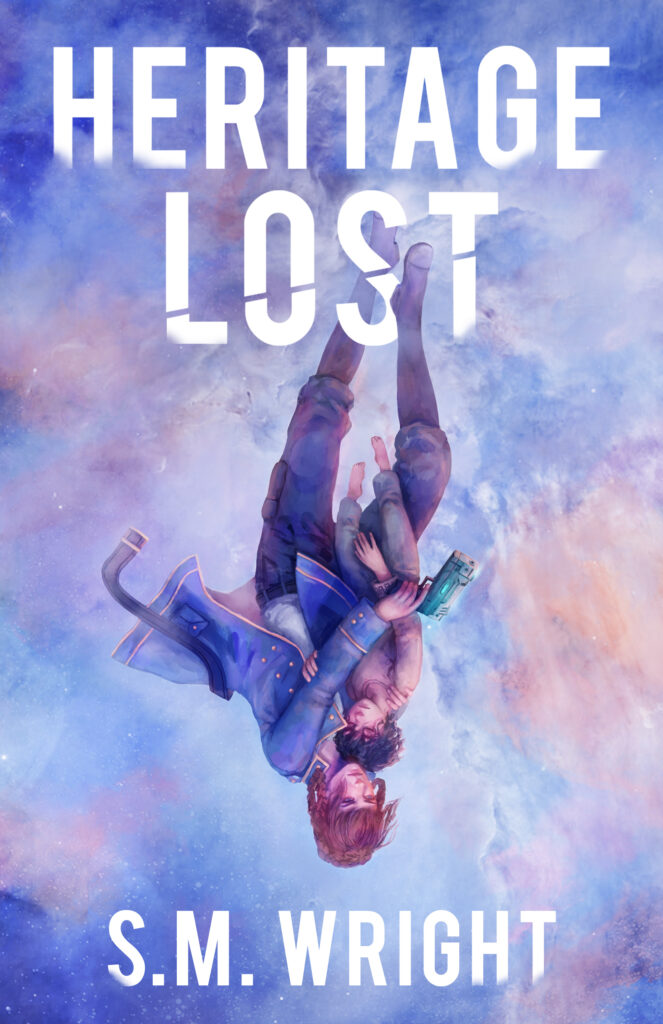There was a time in pop culture when science fiction and fantasy storytelling was peripheral. Now it is dead center, in case the conversations of Star Trek vs. Star Wars, Marvel vs. DC, or Lord of the Rings vs. A Song of Ice and Fire (Game of Thrones) didn’t tip you off. May the odds be ever in your favor.

Author S.M. Wright would like you to add Katya Cassius and the world of the Heritage Lost saga to your media bookshelf. The author, currently doing the promotional circuit for the saga-adjacent book, The Promise, will be at the Hall of Heroes Comic Con at the RV/MH Hall of Fame in Elkhart, IN. “Stop by the Far-Flung Press booth (AA7) from 10 a.m.-6 p.m. Saturday, Sept. 4, and 10 a.m.-5 p.m. Sunday, Sept. 5, to meet me,” encourages Wright. “Fellow author Kylie Betzner will also be at the booth with her collection of comedic fantasy books. We look forward to meeting people!”
MusicTAP spoke with Wright about Heritage Lost, the new world of publishing, wider acceptance of genre fiction, and more. At the end of this article is a special offer that will allow readers to get the digital version of The Promise for free.
The Heritage Lost series is now one story and one prequel in. Could you give me a sense of what the series is about?
The series centers on Katya Cassius as her life derails after rescuing an Oneiroi toddler. The boy carries a genetic disorder capable of trapping himself and others in endless sleep, starvation often the only end. The mutation’s growing frequency has tethered the Oneiroi to Katya’s former government, the Magistrate. So by saving the kid, Katya inadvertently stumbles onto a highly classified program that the Magistrate refuses to let leak to avoid losing a species that has played a vital role in its special forces. Because of this, Katya and her crew find themselves burned.
Throughout the series, as an adopted child herself, Katya takes her responsibility as caretaker for not just Sotiris but the teenage Mina very seriously, trying to do right by them in a galaxy tipping toward unrest and war. She’s also forced to reinvent herself, grapple with her loyalties, and find a new fulfilling path forward, all while knowing she can never go home to her Magistrate family. However, she finds her way back to her original homeworld and must confront a past she was too young to remember beyond the traumatic imagery of blood blotting snow.
When the Magistrate’s expansionism tendencies breed revolt, Katya picks a side while realizing she will never find a perfect cause.
At its heart, the Heritage Lost Series is about identity, family, the cost of conflicts, particularly for children, and sacrifice — with epic space battles thrown in as the series develops and factions rocket into war.
When did the story idea come to you and what influenced its creation?
I began writing Chapter One in Purdue University’s student union in the study space just off Pappy’s Sweet Shop, probably in 2006 or 2007. I had no idea where I was going beyond the main cast would find an alien toddler, and by rescuing him, they would be caught in a conspiracy as he holds a secret in his DNA that the powers-that-be don’t want out. At the time, I religiously watched Battlestar Galactica (2004), and it was definitely a major inspiration for getting me to try my hands at science fiction. Around this time, I was also introduced to Firefly through my brother’s DVD collection.
Prior to Heritage Lost, I largely wrote fantasy since sci-fi writing-wise intimidated me with its scope, which pairs science and extensive world-building. Though, Heritage Lost is more a blend of military sci-fi and space opera rather than hard science fiction.
Other influences include Dune—I was absorbed with Frank Herbert’s world-building as a high-schooler. Star Wars has also been a major part of my life, with my parents introducing my brother and me to it, hoping we would enjoy the original trilogy as much as they had in the ‘70s. And we did.
Beyond genre pieces, history is a constant inspiration in all my writing. The Magistrate is heavily based on the Roman Empire; only it has survived its tumultuous periods to evolve into a galactic superpower that has taken over a sizeable chunk of the galaxy — first through conquest, then later through intervention efforts. When she was a young child, Katya’s original homeworld resembled our world around World War I. Her home country was akin to Russia in 1917-18: in the throes of revolution and civil war. The significant divergence is a technologically advanced superpower stepped in to end the global conflict and just stayed afterward. I also sprinkle other nods to history throughout the books such as an elite unit having 189 pins — referencing the last stand of 189 Swiss guards during the Sack of Rome in 1527.
Nods to Greek mythology also appear in the series, with the Oneiroi being inspired by the Greek primordial deities of dreams (sans the wings). There are other nods as well, such as ship and character names.
We’re in a culture right now where we are surrounded by media that goes deep into the lore. What came first for you in terms of the Heritage Lost series: the characters or the world they are in?
My characters definitely sprung to life first, with the world developing a bit later. It’s very different from my usual process where the world is painstakingly developed prior to even beginning writing. But as I went, the world bloomed alongside the characters and did shape them. Even now, the lore keeps evolving as I continue the series and have more opportunities to explore more of the galaxy’s different cultures and worlds.

What is the most difficult part of world-building?
Keeping track of it all. I try to maintain a clean series bible using OneNote, but sometimes, I trust my brain too much to keep track, and that ultimately results in section rereads since I can’t remember what was decided. It sucks up a lot of time.
The central theme so far focuses on a very sudden change in one’s life mission. Katya Cassius has to redirect her energies from the military to being a guardian. It’s a pretty dramatic shift and I was wondering how you worked out that pacing, to make that new responsibility a natural transition from the previous?
It is a massive shift for Katya. Up to the events in Heritage Lost, she has been dogged in pursuing her military career, and suddenly, that’s gone, and she has this alien toddler she doesn’t know how to care for properly. In many ways, she doesn’t fully grapple with that dramatic shift until Book 2: Descent because she likes to compartmentalize her life. With the need to stay ahead of the Magistrate and a special ops team targeting them, she’s able to bury this sudden shift and the emotions tethered to it. However, in Book II, she’s no longer on the run and can’t fully avoid the full consequences — being driftless for the first time in her life. Her “kids” are very much her focus, but she also grapples with the need for her own separate purpose.
Do you have a plot thread right now for a specific number of stories/novels, or an arc that will play out in however many books as necessary?
The current plan is for a four-book series, with three companion novels. Book II, Descent, is complete and ongoing revisions, and the sequels are outlined with some scenes having already been written out of order. Heritage Lost was very contained, but as the series develops the scale becomes galactic as different factions move to break free from the Magistrate’s fold.
In the course of creating and writing this, did you have a fixed idea for a character that changed? There is a writing phenomenon I’ve heard from many authors speak to where their characters seemingly take over their narratives as their personalities start to dictate what they would and would not do. Did you experience this happening at any time?
Yes, I have had character mutinies—often to claw their way off the death list. In the early stages of plotting the Heritage Lost Series, Katya completely reforged the original plan for the series. In a point of desperation, she turns to a terrorist organization, Plasovern, and the series could have ended as another rebels-versus-the-evil-empire tale except Plasovern’s strategies favor brutality, and Katya has a strict morality that wouldn’t bend. She can’t justify the targeting of civilians. She was also one of those blue-uniformed soldiers and still views several as friends. Her adoptive family, whom she loves, is Magistrate. So while one of her young charges, Mina, is enamored by Plasoverrn’s cause, Katya rejects it and makes the story better for it. It added depth to several characters and the world itself while adding delicious strokes of gray. One of the major benefits of the mutiny was it forced Katya to return to her birth planet and explore her origins, something she wouldn’t have done without pressure forcing her return. There’s a lot of fear there about what she might uncover.
What does that do to you as the author to loosely develop a plot where you put characters in place to move the narrative along, and at some point, it seems the characters are “telling” you these are behaviors they would not do? Is it exciting, or frustrating because some plot mechanics now need to change?
It is super exciting as it often adds tantalizing layers to a narrative—elements that might have gone unnoticed without the characters shaping their stories. It adds a realness that I hope translates to the reader, making them just as invested in the characters and their stories as I am.
But don’t get me wrong. There can be frustration. Sometimes, I’ve had to sit and mull over how to deal with a curveball a character just threw. However, no matter how inconvenient, I’ve found there is always a workaround, and often the story is better for taking the alternative path forward.
What are the benefits of being an author right now, as opposed to 20 years ago or later? Conversely, are there new difficulties for writers that weren’t there 20 years ago?
No matter how weird your research question, Google has the answer; if not, one of the numerous online writer groups will probably have it. Though in all seriousness, the biggest and most impactful change is the ability to pursue numerous publishing routes. Self-publishing used to be a dirty word, but now there are traditionally published authors taking a hybrid approach (mixing traditional and self-publishing) while others start as indie authors and are then picked up by traditional publishing houses. While attending a conference, an editor with TOR noted the stigma has largely lifted from self-publishing. Though that is with the caveat that authors treat it as a business, meaning professional editing, covers/layouts, etc. And the internet has made it easier to find the right professionals.
Additionally, it has never been easier to connect with readers — whether through social media, e-newsletters, podcasts, YouTube, TikTok, Patreon, Kickstarter, etc. The options are almost limitless. With all things internet, this connectivity can have its negative aspects: lost time writing, trolls, feedback overload, etc.
A massive difficulty in the digital era is piracy. Heritage Lost was pirated within a few weeks of its release, though I have no idea how impactful it was on sales. I did send DCMAs where contact information could be found, but it is a hassle and a lot like fighting a hydra—when you take down one pirate site, four or more pop up in its place. For debut or indie authors, piracy could really impact a series’ continuation if the economics just aren’t there. It isn’t cheap producing books.

So-called “genre fiction” now has a level of acceptance that it once didn’t. Everything from science fiction to superheroes dominates pop culture where, at one time, it was considered fringe. As an example, I remember as a kid loving the sci-fi/fantasy book section at the book store, but these sections were always far at the back of the store. We’re talking about famous examples like Fahrenheit 451, Dune, the Foundation series, the Rama novels; titles that are at the front of brick-and-mortar stores. What does it mean for an author to not have to contend with that outdated reader self-consciousness in the marketplace?
For authors, it has opened our books to readers who might not have tried them otherwise. Plus, for those who remain self-conscious about their reading habits, e-readers have become popular — no covers to hide! But really, the prevalence of genre fiction in cinemas is reaching kids and getting them interested in genres, which is vital to any genre’s health.
Sadly, I still see some resistance to genres. There are readers who will simply shut down when they hear the words science fiction. But it is definitely easier to find one’s people with the internet and the prevalence of comic conventions or pop culture conventions.
Has Internet culture broken down walls in terms of what people will seek out in entertainment? Thinking back to my previous question, with the rise of Amazon, ebooks, and Audible, people could interact with media they once did not want to be seen with. Over time, the stigma came away from it and people were not only public consumers, but proud public consumers. Just wanted your take on this.
Internet culture definitely has broken down walls. As noted above, it has enabled like-minded folks to find each other and not feel isolated in their love of certain genres — it has also enabled more varied interaction with properties. There’s been a boom of fan culture, with people cosplaying characters, creating crafts based on them (or replicating items from them, e.g., Dr. Who’s scarf, Jayne’s hat from Firefly, etc.), making fan videos, sharing fanart or fanfiction, etc. Things that were niche are now becoming mainstream. Heck, even GIFs sometimes draw people to a fandom. Forums, Reddit, websites, YouTube, etc., have truly allowed the development of fan communities, reducing stigma.
On the reading side, audiobooks have boomed! They’ve really broken down walls for some readers (including professed nonreaders), and as the sector develops, audiobook productions are becoming something almost cinematic. I quite enjoy The Dresden Files audiobooks. I can’t recommend them enough.
Final question: what is next for you?
Currently, the continuation of revisions on Descent. E-book preorders for it will go live right before Hall of Heroes Comic-Con, with the official release (e-book and paperback) occurring in December. In the background, I’m also working on two companion novels for the series. The first is Heredity; it follows the Oneiroi cast on their own quest after learning of what the Magistrate has been doing to their children born with the defect, and its events occur simultaneously with Descent. The second, Legacy, is a coming of age for Mina as she carves out her own path and cause; it also serves as a bridge to Book III, Once Removed.
For a limited time, people who subscribe to Wright’s newsletter can receive The Promise for free via this link: https://storyoriginapp.com/giveaways/638ec91c-f08c-11ea-a685-c788fdf87aef.